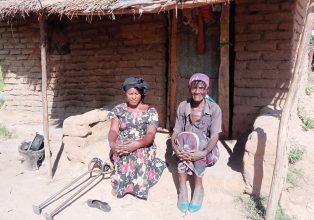Reversing plight of the elderly
 Her plight, she thought, was over. Beaten, insulted and sidelined because of being suspected of practising witchcraft, Mary Masingo, 72, from Mlungu Village, T/A Chamba, Machinga, endured all she could.
Her plight, she thought, was over. Beaten, insulted and sidelined because of being suspected of practising witchcraft, Mary Masingo, 72, from Mlungu Village, T/A Chamba, Machinga, endured all she could.
Old, frail and living with her 13-year-old grandson, she hid her shame in closed doors of her one-door grass-thatched shack, searching for comfort in solitude.
Just as she thought she had found it, a tragedy struck her. She lost her sight and when the village realised it, hell broke loose. That was five years ago.
“They said my loss of sight was proof that I was a witch. They said God was punishing me.
“As a result, some people stormed my house and burnt some of my belongings. If it weren’t for the chief’s intervention, I could, by now, have been evicted from the village,” she says.
Losing sight due to ageing—according to a 2011 study by Dr Charles Chilimampunga, a sociologist, and George Thindwa of the Association for Secular Humanism—is one factor that villagers use to substantiate their accusations that the elderly practise witchcraft.
The United Nations General Assembly designated June 15 as World Elder Abuse Awareness Day. It represents the one day in the year when the whole world voices its opposition to the abuse and suffering inflicted to some of our older generations.
For Thindwa—a humanist activist who argues that witchcraft does not exist—public awareness meetings are needed to familiarise the public with the provisions of the Witchcraft Act and to make people aware of human rights.
That could be a social response to the problem. But, according to Dr Khumbo Kalua, an eye specialist at Zomba Central Hospital, losing sight due to old age is a biological problem that simply needs medical intervention.
“Almost 30 percent of the elderly in Malawi lose sight due cataracts. A cataract is a clouding of the lens inside the eye which leads to a decrease in vision. Those with cataract commonly experience difficulty appreciating colours and changes in contrast, driving, reading, recognising faces, and experience problems coping with bright lights,” Kalua says.
Interestingly, these are some of the symptoms that Masingo explained during the interview.
But although cataracts are treatable by way of surgery, it never occurred to Masingo that her situation could be treated.
“I thought my blindness was a curse and that perhaps I had done something wrong or I had been bewitched. I didn’t go to any herbalist, but I know a number of people who resort to herbalists when they lose their sight,” says Masingo.
This, according to Kalua, is a sign of ignorance on eye problems in the country.
“There is general ignorance in the villages about eye problems—especially cataracts. Few people understand that cataracts can be treated. I think it is the ignorance that leads some to suspect others of witchcraft. I have heard a lot of these stories in my work,” he says.
He says partly to blame for this is the way eye problems are not prioritised in the country’s health care framework.
“I think most of the funds for health go to salaries, malaria, HIV and Aids, tuberculosis and other challenges which are considered pressing. There is little that goes to eye care. And because of that, most district hospitals do not just have the capacity to treat eye problems or to conduct awareness of the problem,” he says.
He adds that with K10 000 [about $25], it is possible for a person with a cataract to be operated on and have their sight restored at a central hospital.
“However, most [district] hospitals have capacity challenges to transport these people to hospitals and look after them for at least two days.
“Beyond that, you also need a medical team and tool kit to be taken to a health-centre that is close to people. So, there are all these logistical challenges,” he says.
Quoting statistics for the South West Zone of the country, Ministry of Health spokesperson Henry Chimbali says there are approximately 1 682 cases of people with un-operated cataracts in the zone which comprises districts such as Balaka, Blantyre, Zomba and Machinga, with twice this number having cataract causing severe visual impairment and three times the number with low vision.
“The cataract remains a major cause of blindness in Malawi and effective programmes to increase cataract surgical coverage need to be implemented.
“Our major challenge is to create awareness for increased access to treatment and management in eye care among undeserved communities through effective communication. We find this a better approach to increase demand for available services,” he says.
To complement government efforts, Kalua runs the Blantyre Institute for Community Ophthalmology (Bico).
“The objective is to raise funds to fill the gap that is there in helping people regain their sight. We know government cannot meet the challenge alone,” he says.
With support from various well-wishers across the globe—individual charities and organisations—Bico has, for the past few years, been conducting free eye screening, surgeries and also providing reading glasses to people with various eye problems in rural areas.
“Early this month, we operated on about 200 elderly people with cataracts at Machinga District Hospital. We did this in two weeks. We provided transport to patients from across the district; and brought tool kits and medical personnel from Zomba Central Hospital,” he says.
All of these people, today, have their sight back. And one of them is Masingo.
“This is unbelievable. I just couldn’t imagine having my sight back. The process was not even painful. I thank God for this,” she says.
Happy as she is, Masingo’s only hope is that the villagers will no longer consider her a witch.




